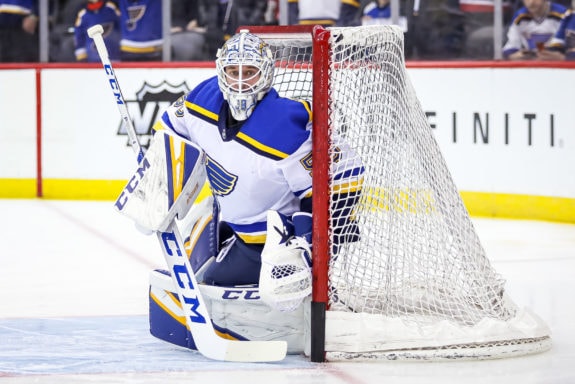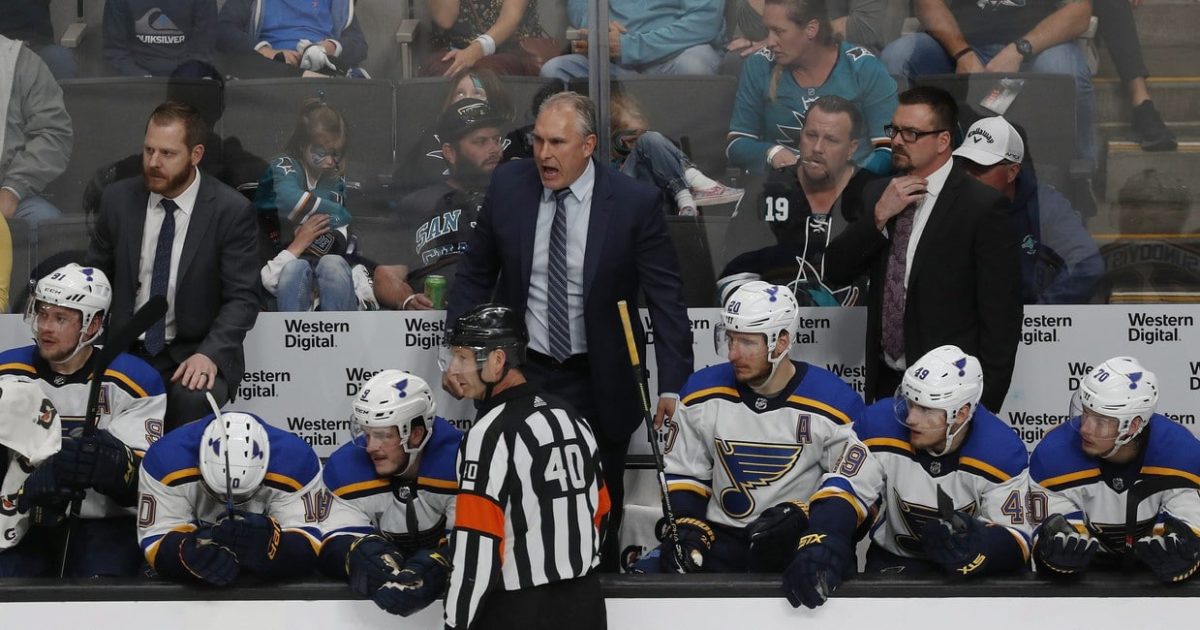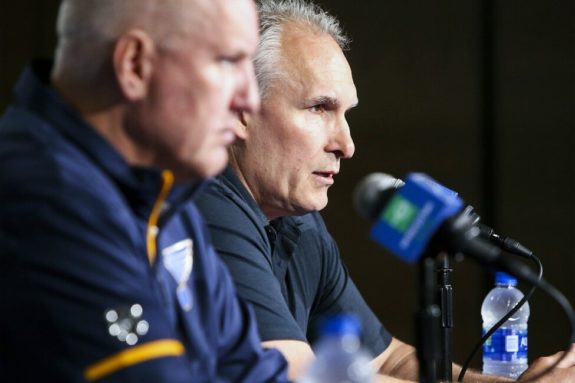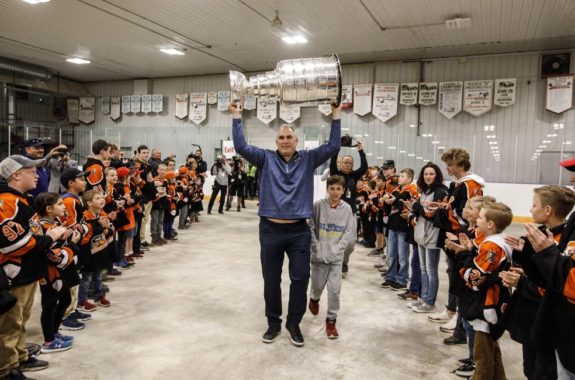The St. Louis Blues’ 2020-21 season had its highs and lows, but ultimately ended in disappointment after the team fell in four games to the Colorado Avalanche in Round 1. In this series, we’ll look back on the season, player by player, and evaluate each player’s performance as an individual, with an eye towards their future with the team.
It’s always difficult to isolate a coach’s performance from the players on his team, and St. Louis Blues head coach Craig Berube is no exception. Few would rank the team’s performance as anything but a disappointment, but how much of that falls at the feet of coaching? That’s our job to answer today. Let’s start with the positive.
What Went Right
A series of things did go well for the Blues this season, so let’s give Berube credit where it’s due.
Postseason Push
Even as deep into the season as late April, the Blues looked like they might potentially surrender the fourth playoff spot to either the Arizona Coyotes or Los Angeles Kings, despite the fact that few experts placed the team any lower than third in the West Division entering the season. But the Blues quickly turned that around, found their winning touch, and comfortably pushed into the playoffs. Much of that was thanks to the contributions of goaltender Jordan Binnington. But Berube’s impact can’t be ignored.

From April 24 on, the Blues claimed points in all but one contest they played in, an 11 game stretch that turned their season around and got them into the playoffs. For a mid-market team, the added revenue of even just four playoff games is significant, so the importance of that run to the franchise shouldn’t be ignored.
Power Play
Despite some struggles early on, the team’s power play eventually gelled, and finished sixth in the league with a 23.2 percent success rating. New arrivals like Torey Krug and Mike Hoffman found their stride, especially late in the season, and gave that unit a much-needed jolt.
Kyrou, Walman, Mikkola Shine
Berube has earned a bit of a reputation for stifling young players. But this season, Jordan Kyrou (22) became one of the team’s breakout stars. On defense, Berube had to lean heavily on Jake Walman and Niko Mikkola (24), especially late in the season. Other young players like Austin Poganski (24), Dakota Joshua (24), and, of course, Robert Thomas (21) saw opportunities as well. In that group, only Thomas disappointed expectations, but that can hardly be blamed on the coach.
What Went Wrong
Unfortunately for Berube, plenty went wrong during his second full season at the helm of the team. Let’s take a look at the lowlights.
Berube’s Offensive Failure
Anyone watching Blues broadcasts frequently enough knew full well about the head coach’s offensive strategy: he encourages his players to move the puck around until they find ideal shooting lanes, rather than focusing on getting pucks on net and hoping for fortunate bounces. In other words, Berube desires shot quality over shot quality. But in this season, he ended up getting neither.

According to Natural Stat Trick, the team’s offensive metrics weren’t good. They finished 23rd in the league in shots, 28th in the league in expected goals (xG, 129.63), and 30th in the league in high danger chances for with 475. By comparison, the Avalanche and Vegas Golden Knights, the two best teams in the division, finished 3rd and 4th with 702 and 690 HDCF respectively. That number alone condemns Berube’s offensive strategy, and it was one of the team’s primary shortcomings during the season.
Second Periods
For whatever reason, the Blues simply did not perform in the second period. It became a bugaboo that plagued their entire season, and Berube never seemed to have answers. Opponents outscored St. Louis 63-52 throughout the regular season and 7-4 in the four-game playoff series against Colorado. With an entire season’s data, it’s impossible to ignore this troublesome trend for the Blues, and the inability to address it ultimately rests at the coach’s feet.
The Playoffs
On the one hand, it’s tough to deny that the Avalanche were a significantly better team than the Blues, especially with the latter missing top scorer David Perron. On the other hand, Berube certainly didn’t have any answers for the high-powered Colorado offense. Despite being their best defender for the entire season, Justin Faulk was third amongst defensemen in minutes during the playoffs, trailing Krug by almost four minutes a game and the clearly-injured Parayko by almost five. He refused to play top youngster Klim Kostin, despite being heavily outmatched early in the series. Late in the series, lines seemed almost chosen at random, with Ivan Barbashev, Ryan O’Reilly, and Vladimir Tarasenko starting Game 4 as the top unit. The four-game sweep was a brutal drubbing, but Berube certainly didn’t help his team improve.
Mismatched Visions with Armstrong
We’ll close with one overarching theme of Berube’s performance this season, because it may say the most about his future with the franchise. It’s hard to deny that the head coach’s vision of the team did not mesh with his general manager’s. GM Doug Armstrong had his own struggles, but there’s no question that he is trying to build the Blues into a faster, more transition-focused team, while Berube remains focused on the kind of forechecking and heavy, plodding, defensive hockey that helped the Blues win the Stanley Cup in 2019.

The biggest example of this disagreement was seen in the person of Mike Hoffman. Armstrong signed the forward to a one-year, $4 million contract shortly before the season, and from the offset, he was on the outs with Berube. Despite being elite at one skill, namely, power play scoring, Berube refused to utilize Hoffman on the top power play unit from very early in the season. The forward seemed sure to be traded at the deadline after receiving multiple healthy scratches, but Armstrong stood his ground, and Hoffman became a major factor in the team’s late turnaround once Berube finally started to utilize him better. Though it’s just one player, when a GM spends $4 million on a signee, especially in a flat-cap era, the coach needs to use him well. Berube’s refusal to do so could foretell issues for the pair in the future.
Key Stats
- Last in the league in High Danger Chances at 5-on-5 (370) and 30th at all strengths (475)
- 25th in the NHL in xGF% (46.09)
- Outscored in the second period 63-52
- Outscored 20-7 in four-game playoff series
- Climbed to 8th in Blues coaching history in wins (80)
Final Grade: F
It may seem harsh, but it’s difficult to point to moments where the Blues’ head coach made his team better this season. He did give an opportunity to Kyrou, who took it and shined through much of the season. That was one of his strongest accomplishments. But Berube’s offensive strategy was a total failure and one from which he absolutely refused to deviate throughout the season. Moreover, even with the grace one ought to give the Blues for facing a team as tough as the Avalanche, the coach’s squad was completely outmatched in the playoffs, and the coach didn’t seem to have any answers. Few would deny that Berube is more of a “motivational” or “player’s coach” than a strategist, but this season, it seems that message fell on deaf ears.
What’s Next for Berube?
Blues fans will always have a special place in their heart for Berube for coaching the team to a Stanley Cup. But the team has only won two of 10 postseason games since then, being outscored 42-23 in the process. It’s certainly possible that Berube, a motivational coach, doesn’t have the strategic acumen to last long-term with a team. That journey would mirror his tenure with the Philadelphia Flyers.

There is just one season left on the contract Berube signed after wnning the Stanley Cup. At this point, it seems clear that there’s a difference of visions between Armstrong and Berube. When those kinds of differences arise, the GM typically outlasts the head coach, particularly when the GM’s tenure with the team is as long as Armstrong’s has been. Barring any shocking turn of events, Berube will likely enter the 2021-22 season with a fairly long leash still, given what he’s done for the franchise. But if the team’s results aren’t significantly better, the Blues might not be interested in bringing him back on a new deal.